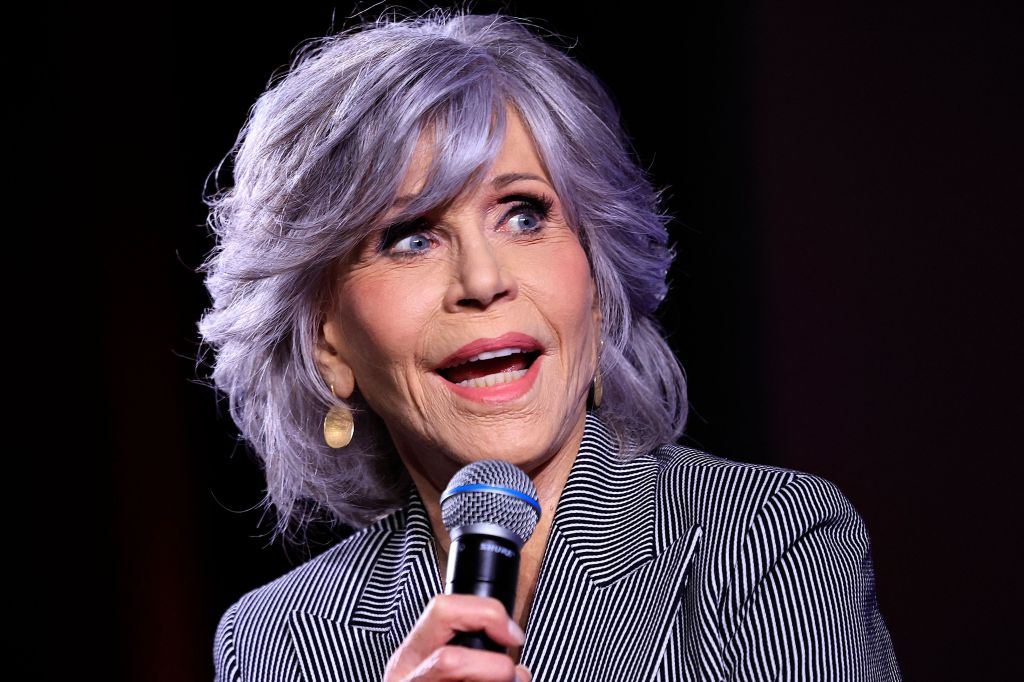
In a wide-ranging conversation at the Cannes Film Festival today, Jane Fonda did not hold back, offering uncensored opinions on Robert Redford, Jean-Luc Godard, Michael Douglas, and Katharine Hepburn, not to mention climate change.
Her comments about co-stars and colleagues weren’t always flattering. Speaking at the Rendezvous with Jane Fonda event at the Salle Buñuel, the two-time Oscar winner said she “was in love with” Redford, her leading man in four films including Barefoot in the Park, and The Electric Horseman. But in a kiss-and-tell disclosure, she said of Redford, “He did not like to kiss,” referring, presumably, to film roles with her. She added, “I never said anything [to him about it]. And he’s always in a bad mood, and I always thought it was my fault.”
She added, “He’s a very good person. He just has an issue with women.” She did not elaborate and the moderator did not follow up.
More charitably, she said Redford possesses a good sense of humor, if not punctuality. “The last movie I made with him was six years ago [Our Souls at Night]. What was I, about 80 years old or something like that. And I finally knew I had grown up. When he would come on the set three hours late in a bad mood, I knew it wasn’t my fault.” Nonetheless, she said, “We always had a good time.”
Alain Delon, her co-star in the 1964 French film Joy House, on the other hand, she said liked to kiss. She noted how gorgeous he was at that time, but “not so much now. He’s had a rough life. But then he was the most beautiful human being.”
Regarding French filmmaker Jean-Luc Godard, who directed her in 1972’s Tout Va Bien, she said, “He was a great filmmaker. I take my hat off. A great filmmaker. But as a man? I’m sorry. No, no.”
Fonda had complimentary words for Lee Marvin, her co-star in 1965 Western-comedy Cat Ballou, but referenced what she said was his hard drinking. “I loved making the movie. And Lee Marvin was fabulous,” she recalled. “He was very funny. He was always drunk. We stayed at the same motel, and they had to carry him up the stairs.”
She shared that at one point during filming she got a tooth knocked out, but on the low budget production they just kept going as if nothing had happened.
“We would shoot sometimes 14 hours a day,” she noted. “And Lee Marvin took me aside and he said, ‘Fonda, we’re the stars of this movie. If we allow them to work us so many hours, we’re not the ones that get hurt. It’s the crew. We have to stand up for the workers, for the crew, and we have to refuse to work these long hours. We have to stand up for the crew.’ And that had never occurred to me. That was a huge lesson from Lee Marvin.”
In response to an audience question, Fonda spoke about making On Golden Pond with her father, Henry Fonda, and Katharine Hepburn — who at that point had earned three Academy Awards.
“It was one of the most glorious experiences of my life. It was absolutely wonderful,” Fonda said. “I made the movie for my father. But the person who I learned from on that movie was Katharine.”
The film earned her father an Oscar and another one for Hepburn too – her fourth as Best Actress.
“All three of us were nominated for Oscars, me for supporting, her for Best Actress, my dad for Best Actor. I didn’t win. And they did,” she recalled. “And I called [Hepburn] up to congratulate her and she said, ‘You’ll never catch me!’”
She said she didn’t think Hepburn liked her. She also said she felt Michael Douglas, her co-star in The China Syndrome, “probably doesn’t like me” either, but possesses the diplomatic skill to hide it, a tactful style that she says she lacks.
Fonda described Lily Tomlin as her favorite co-star. They first worked together on 9 to 5, and most recently on 80 for Brady, released earlier this year. She said she doesn’t have any other movie or TV roles lined up and is planning to focus most, if not all, of her attention on the issue of climate change.
“We still have reason to be hopeful if we do everything right. But I’m saying this is serious. We’ve got about seven, eight years to cut ourselves in half of what we use of fossil fuels,” she said. “And unfortunately, the people that have the least responsibility for it are hit the hardest — Global South, people on islands, poor people of color. It is a tragedy that we have to absolutely stop. We have to arrest and jail those men — they’re all men – [responsible for the crisis].”
Responding to an audience question she said, “It’s good for us all to realize, there would be no climate crisis if there was no racism. There would be no climate crisis if there was no patriarchy. A mindset that sees things in a hierarchical way. White men are the things that matter and then everything else [is] at the bottom.”
She added, “So when I say that I’m fighting the climate crisis, I also feel that I’m fighting patriarchy and racism. It’s important because we have to get out of the silos — feminists over here, environmentalists over here. That’s what I learned when I started being an activist around the Vietnam War. The more you go down any issue, whatever it is, you realize that it’s all connected. And if we solve the climate crisis and we haven’t solved those other things, we’re gonna be in trouble.”













